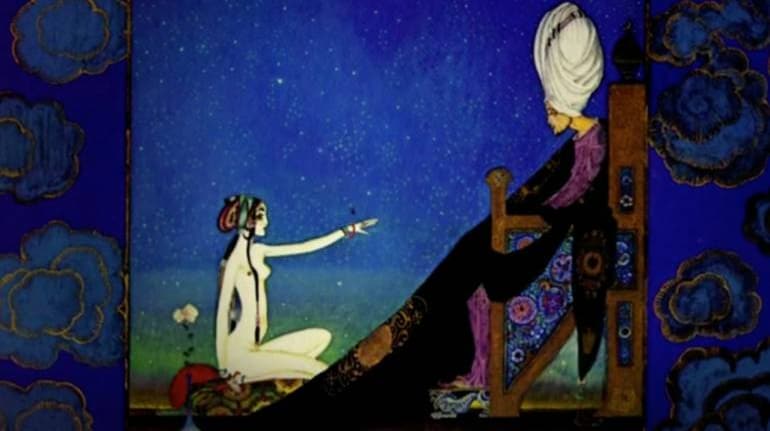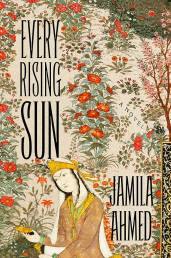



In Husain Haddawy’s translation of The Arabian Nights, Shahrazad turns to the embittered King Shahrayar on their wedding night and says, “May I have your permission to tell a story?” The king replies, “Yes,” and Shahrazad says: “Listen.”
Since that night, countless people have listened to and been entranced by the stories of Scheherazade, as her name is also spelt. Originally an ocean of tales with tributaries from India, Persia and elsewhere, the Nights have no single author or date of composition. These 1001 stories within stories have been translated many times into many languages, notably by Antoine Galland, who added new material such as the sagas of Aladdin and Ali Baba; and later by Richard Burton, whose oriental fantasies still hold sway.
Its influence has been immense. From Alexandre Dumas to Walter Scott, from Jorge Luis Borges to Salman Rushdie, the stories, forms and techniques have inspired countless writers. As Marina Warner has commented, the tales “escape from the limits of time that the narrative struggles to impose”. They keep generating more tales “in various media, themselves different but alike: the stories themselves are shape-shifters”.

Jamila Ahmed’s debut novel, Every Rising Sun, is one such shape-shifting version. What is unusual about this work is that it is situated in a specific historical place and time. Ahmed’s King Shahrayar is a 12th-century leader of the Seljuk Turks in Kirman, now a city in southeast Iran, and he is called upon to aid Saladin during the Third Crusade.
The spotlight is on Shahrazad throughout, which makes Every Rising Sun not only a testament to inventive storytelling but also a reorienting from a woman’s point of view. Like some before her, Ahmed adds Shahrazad’s own story to the others that she narrates.
In this telling, it is Shahrazad who is inadvertently responsible for the sultan learning about his first wife’s infidelity, which sets him off on an odyssey of nuptial decapitation. Horrified at what she has brought about, Shahrazad plans to become his next bride and save the day through her powers of narration. “I will continue, night after night,” she says, “wrapping him in tale after tale, until curiosity lulls his bloodlust, until stories of honour and goodness and bravery return to him his humanity”.
She embarks on this storytelling project with the able assistance of her sister Dunyazade, despite the reservations of her father. Soon, she starts to sense her power: “small and startling, this ability to captivate with my tales — and achieve my ends.”
Before long, however, the sultan is summoned to join Saladin in his battles against leaders such as Richard the Lionheart and Philip II of France. The crusades are narrated through Arab eyes, so to speak, a necessary corrective to mainstream accounts. Shahrazad and Dunyazade form part of the sultan’s entourage as they brush up against the world beyond Kirman, across the deserts to bustling Baghdad and beyond. Her storytelling continues during the journey, looping around real-life encounters that test abilities, awaken desires, and allow her to write her own destiny.
This mix of the historical and the fantastical creates a two-toned narrative, and at times, the differences can be uneasily stark. However, as Ahmed writes in the afterword, her intention is not just to recreate the tales of the Arabian Nights but also to compose an ode to medieval Islamic history, “the diversity of culture, religion, people, art, literature, and food that powered global culture for centuries”. The richness and splendour of the time is delineated with grace and conviction.
As though to emphasise this, Ahmed’s prose style is profusely descriptive. From the start, there are palanquins bedecked with silver bells, turquoise-tiled arches swooping like snowy swan necks, and silver and gold lanterns glowing with a soft, firefly light. Interiors are fragrant with frankincense, and meals spiced with thyme and saffron. At times, the unfortunate – and surely unintended — effect of this lushness is to turn the events and places into the exotic, beguiling scenes so beloved of the Europeans who first came across them. In contrast, some recent translators of the stories, such as Hanan Al-Shaykh and Yasmin Seale, have emphasised the simplicity and orality of the language.
For all that, Jamila Ahmed’s Every Rising Sun is notable for the ingenuity with which it combines history and fantasy. Shahrazad’s feistiness and resourcefulness make her an appealing character in her own right, and the way her story is fleshed out is appropriately frame-breaking. In this novel, as Ahmed writes, there are “words that can bind hearts, break a marriage, rupture an empire”.
Discover the latest Business News, Sensex, and Nifty updates. Obtain Personal Finance insights, tax queries, and expert opinions on Moneycontrol or download the Moneycontrol App to stay updated!
Find the best of Al News in one place, specially curated for you every weekend.
Stay on top of the latest tech trends and biggest startup news.